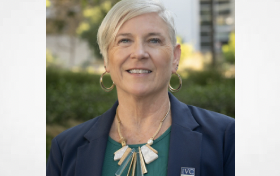Author: June McLaughlin
June McLaughlin is Professor & Paralegal Studies Program Director at Irvine Valley College in Orange County, CA. She teaches business law and paralegal studies courses. In 2019, IVC’s Paralegal Studies program received ABA approval. Professor McLaughlin has taught Sales, Securities Regulation, and Cannabis Law and Policy at University of La Verne College of Law and Public Service. June is former Editor-in-Chief for the Journal of Law, Business & Ethics, and faculty advisor to the Asian Pacific American Law Students Association (APALSA) at La Verne. She has taught at the undergraduate level in the US and the UK. June has co-authored a Business Law textbook, published book chapters, essays, and law review articles primarily focused on securities regulation in emerging markets. She has begun to publish articles related to cannabis regulation. She has presented her research in the US and internationally. She is a Securities Arbitrator for the Financial Industry Regulatory Authority (FINRA) and is admitted to practice in California and New Jersey.
California SB-1012 The Regulated Psychedelic Facilitators Act and the Regulated Psychedelic-Assisted Therapy Act enabled the creation of a regulatory framework for the therapeutic use of psychedelics in the state by trained, licensed facilitators. Licensure processes were anticipated to begin in April 2026. In December of 2024, Colorado’s Natural Medicine Division, which sits under the Colorado Department of Revenue, began to accept license applications on all levels and for becoming a facilitator. 11 training programs are listed as approved in Colorado to deliver psychedelic facilitator training. As expected, the psychedelic facilitator license has specific training requirements in terms of instructional hours, and time spent practicing the work before being licensed – a practicum requirement among other things. Colorado’s framework looks slightly different from Oregon’s, perhaps benefitting from Oregon’s learning curve. Colorado applicants can receive a license by endorsement which requires an active equivalent facilitator license from another state.
California’s facilitator training framework may make improvements on what is currently in place in Colorado and Oregon. One California facilitator training program in California is on the Oregon Health Authority’s (OHA) approved program list, is the UC Berkeley Center for the Science of Psychedelics. Berkely offers a Psychedelic Facilitation Certificate Program. Its emphasis is spiritual care, ancestral traditions, equity, and access. The program began in 2022 and is designed for healthcare professionals and those working in religious, spiritual care as well. This year the program will move to the Berkeley School of Education. The program is primarily in person with some online components. There are 200 instructional hours over a 9-month period and the standard fee is $14,000 with the potential of additional fees for practicum hours. Discounts and financial aid is available. It is interdisciplinary with instructors from Chaplaincy, medicine, psychology, psychiatry, social welfare, ethics, and entheogenic traditions. Berkely focuses on psilocybin, MDMA, and ketamine facilitation.
Another training program approved by the OHA; the California based Alfred M. Hubbard Institute (AMHI) Psilocybin-Facilitator Training program is primarily online class meetings in the evening and weekends. The optional 40-hour practicum requirement is in person and AMHI purports to prepare students to take the Oregon facilitator licensing exam. Oregon requires a practicum for licensure and students can complete that outside of this training program. There are 124 hours of instruction on 9 topics including: Historical, traditional, and contemporary practices and applications, Cultural equity in relation to psilocybin services, Safety, ethics, and responsibilities, Psilocybin pharmacology, neuroscience, and clinical research, Core facilitation skills, Preparation and orientation, Administration, Integration, and Group facilitation. It costs $3000 and takes 17 weeks to complete. This meets OHA requirements. Alfred Hubbard was a proponent of LSD assisted therapy during his lifetime. The Institute’s student handbook has several pictures of Hubbard but did not explain the affiliation or use of the name. The lead educator on the Institute’s website previously taught college courses in economics, statistics, and molecular biology.
These drastically different approaches to training meet the state requirements. Students of each choose a vastly different experience as students regularly do. It is the state’s job to ensure that professions meet minimum standards. For this new profession that involves stigmatized previously illegal substances what should the priorities be for facilitator training? Should facilitators be required to try the substance themselves? And what ethical standards should be imposed without being oppressive or burdening the profession in a manner that deprives those who need this therapy? Today the health care practitioners are in short supply. California created a pilot program to allow physicians and dentists from Mexico to obtain a three-year nonrenewable license to practice medicine with AB 1395. Patient protection is a policy requirement as is providing care that is in demand and proven to be effective as psychedelic assisted therapy has.
—


















